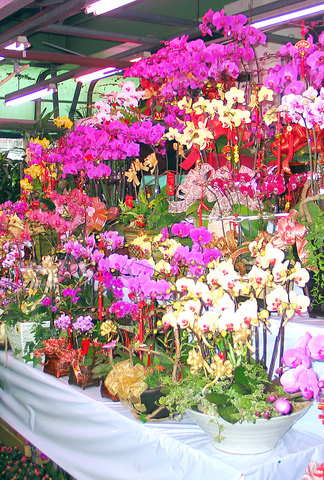Before sundown on Lunar New Year's Eve, you need to clean the house, settle outstanding debts, resolve any differences with family and friends and purchase the essential holiday flowers. The last project can be achieved at the flower markets under the Jianguo expressway, or in Neihu.
In preparation for the New Year celebrations, both markets flourish with an array of holiday plants, flowers and consumers.

PHOTO: DIANA FREUNDL, TAIPEI TIMES
On any regular weekend, Jianguo Flower Market (
While Jianguo is the more tourist-friendly market, Neihu boasts a larger size and se-
lection. Formerly part of the Bingjiang Street fruit and flower market, it relocated to the bigger venue in Neihu a few years ago. The market carries everything associated with plant life, from seedlings and gardening tools to gigantic potted plants. An early morning trip witnessed numerous florists stocking up on holiday flora to be sold at their own neighborhood vendors.
Most of the flowers sold at the market are grown in Taiwan, but there are a variety of imported plants and flowers. Orchids, kumquat trees, bamboo, water lilies and plum blossoms are the most in demand at this time of year, said Zhou Jing-ping (
"Any flowers or plants are suitable. People even buy daisies for their homes; but just don't give them [daisies] to someone, because they are associated with bereavement," he explained.
While each plant is associated with a particular meaning, fresh flowers and plants in general symbolize rebirth and growth, so they are an essential New Year's decoration.
Orchids or plum blossoms arranged with bamboo and pine stems are one of the most common combinations and symbolize perseverance, unity and longevity. Tangerines, oranges and kumquat trees are also popular for their representation of wealth and fortune.
In terms of pricing, the best deals are found in Neihu, where orchids sell for NT$200 per stem while more elaborate arrangements in decorative vases cost NT$2,500 on average . Kumquat trees range from NT$400 to NT$1,500 depending on size. Single flowers and bouquets sell for a fraction of what they cost at smaller markets. Twenty long-stemmed red roses, which cost NT$50 in the Neihu market, are sold for NT$200 or more by some flower vendors.
Filling a home with flowers may not bring wealth or career advancement, but without the roots there can be no fruit. And lucky is the home in which a plant blooms on New Year's Day: This foretells a year of prosperity.
To accommodate seasonal customers, the hours of operation at both markets have been extended until New Year's Eve. The Neihu Flower Market is located at 400, Rueiguang Rd, Neihu, (

As Taiwan’s second most populous city, Taichung looms large in the electoral map. Taiwanese political commentators describe it — along with neighboring Changhua County — as Taiwan’s “swing states” (搖擺州), which is a curious direct borrowing from American election terminology. In the early post-Martial Law era, Taichung was referred to as a “desert of democracy” because while the Democratic Progressive Party (DPP) was winning elections in the north and south, Taichung remained staunchly loyal to the Chinese Nationalist Party (KMT). That changed over time, but in both Changhua and Taichung, the DPP still suffers from a “one-term curse,” with the

Jan. 26 to Feb. 1 Nearly 90 years after it was last recorded, the Basay language was taught in a classroom for the first time in September last year. Over the following three months, students learned its sounds along with the customs and folktales of the Ketagalan people, who once spoke it across northern Taiwan. Although each Ketagalan settlement had its own language, Basay functioned as a common trade language. By the late 19th century, it had largely fallen out of daily use as speakers shifted to Hoklo (commonly known as Taiwanese), surviving only in fragments remembered by the elderly. In

William Liu (劉家君) moved to Kaohsiung from Nantou to live with his boyfriend Reg Hong (洪嘉佑). “In Nantou, people do not support gay rights at all and never even talk about it. Living here made me optimistic and made me realize how much I can express myself,” Liu tells the Taipei Times. Hong and his friend Cony Hsieh (謝昀希) are both active in several LGBT groups and organizations in Kaohsiung. They were among the people behind the city’s 16th Pride event in November last year, which gathered over 35,000 people. Along with others, they clearly see Kaohsiung as the nexus of LGBT rights.

In the American west, “it is said, water flows upwards towards money,” wrote Marc Reisner in one of the most compelling books on public policy ever written, Cadillac Desert. As Americans failed to overcome the West’s water scarcity with hard work and private capital, the Federal government came to the rescue. As Reisner describes: “the American West quietly became the first and most durable example of the modern welfare state.” In Taiwan, the money toward which water flows upwards is the high tech industry, particularly the chip powerhouse Taiwan Semiconductor Manufacturing Co (TSMC, 台積電). Typically articles on TSMC’s water demand